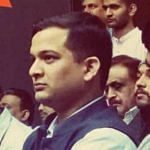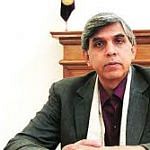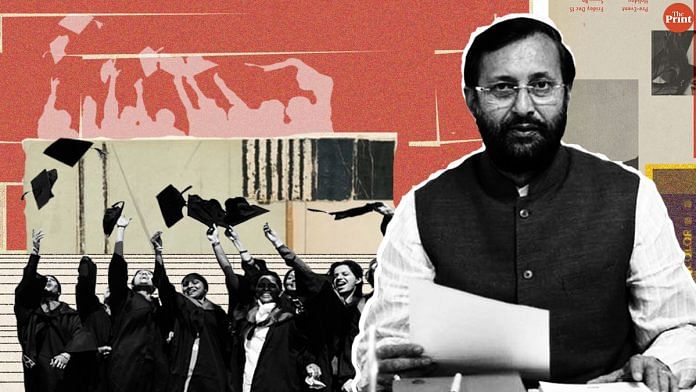A circular issued by the Central University of Kerala asking all the departments to prepare a list of projects for PhD scholars in line with “national priorities” has triggered a national debate and led to the resignation of a professor. The circular comes months after the HRD ministry held a meeting with the V-Cs on the issue.
ThePrint asks: PhDs in ‘national priorities’: How does Javadekar-led HRD stand affect Indian scholarship?
A framework on ‘national priority’ will make our research field far more dynamic and productive
 Swadesh Singh
Swadesh Singh
Assistant professor, Delhi University
Scholarship and research need rational approach and critical thinking. They carry a context and are conducted within predefined parameters. The methodology used in research is decided upon by the researcher and her/his supervisor after conducting a pre-research study and assessments.
Given the fact that our resources are limited and our socio-economic problems are numerous, what is needed in higher educational institutes is a framework for research topics. This is more important in social sciences as focused research can go a long way in finding lasting solutions to our critical national problems.
In the field of sciences, Tata Institute of Fundamental Research (TIFR), Indian Space Research Organisation (ISRO), Defence Research and Development Organisation (DRDO), Indian Council of Agricultural Research (ICAR), and Council of Scientific & Industrial Research (CSIR) among others have done a tremendous job at establishing a strong precedence and clear trajectory of research on indigenous subjects of contemporary and national importance. What the ministry has issued is an advisory to public-funded institutions and it is well within its rights to do so.
It is wrong to assume that topics of ‘national priority’ are inimical to research. In fact, this sort of a framework is bound to make our research landscape far more dynamic, productive and relevant than it is today. Of course, it is another matter entirely if the objections to this move stem from the very use of the word ‘national’ in academics.
Research subjects are decided through a holistic, fair, and critically immersive method
 Dinesh Singh
Dinesh Singh
Former V-C, Delhi University
Every university has a board of research studies, or similar mechanism in place via which PhD research subjects are thoroughly reviewed. It isn’t as if any research subject pitched is uncritically allowed to get through. There is always some give and take, and attempts to improve the PhDs. The research subjects are decided through a holistic, fair, and critically immersive method. I am not suggesting this is a fool-proof method, it may have its shortcomings. But these things should never be directed by the central government.
Moreover, we should ask ourselves what is meant by “national priority”. For instance, in a subject like Mathematics, a lot of research being done may seem unimportant today, but the impact of it is often seen years later.
Einstein’s theory of General Relativity could easily have been refuted and dismissed as not being a national priority when he was theorising the same. Today, however, it is of revolutionary importance.
The clarification issued by the human resource development ministry also focuses largely on subjects related to science and technology. What about social sciences and humanities? They too are important planks of scholarship and must never be ignored.
Of course, if someone comes up with a PhD idea that advocates making of bombs and studying them through a thesis, it is never something that would be approved.
Also read: Despite post-Balakot confidence, why Modi govt rushed to avert university quota crisis
Universities funded with public money have a responsibility to govt and policymakers
 Vandana Mishra
Vandana Mishra
Assistant professor, JNU
The circular issued by the university at the behest of the HRD ministry emphasises the need to focus on national priorities with respect to PhD research. The government is well within its rights to delineate what the country’s pressing issues are. Even after a particular topic has been defined as national security, there are always a variety of ways to approach it and research it.
For instance, with respect to the subject of terrorism, one can look at those who are victims of terrorism and one can also research about those who are falsely implicated under charges of terrorism.
Similarly, students can research the menace of Naxalism from the point of view of state development challenges instead of looking at the state as an oppressor. Thus, even though a subject is broadly defined as a national priority, there are always multiple angles through which it can be analysed.
Universities funded with public money not only have a responsibility towards the public, but also towards the government and policymakers. It may seem that the work of academicians and that of politicians is dramatically different, but that isn’t true. Academicians build the base for a lot of governance. Science, environment, climate change are all national priorities. And also, it is not always right to see government directives as ‘interference’.
All these attempts to curtail thought and intellect are a result of Modi government’s insecurities
 Purushottam Agarwal
Purushottam Agarwal
Professor and author
Every university has a certain method to decide PhD research topics. This is based on a variety of things including the availability of professors, and what the university has traditionally excelled in. The Jawaharlal Nehru University is known for certain subjects, Aligarh Muslim University and Delhi School of Economics for others. The PhD research topics are decided at the local level and autonomously by the university itself, within the framework of broad intellectual curiosity, emerging thoughts and issues society is facing.
The problem with the Narendra Modi government is that it suffers from a serious case of inferiority complex. They are mediocre and so they hate excellence of any kind. They suffer from the authoritarian disease of wanting to be in control all the time.
This circular, too, is rooted in this sort of authoritarian mentality. It’s disastrous for the country and for Indian scholarship. The central government has no business dictating research topics to universities.
The ultimate aim of this exercise is to curtail any kind of intellectual curiosity and adventurism. We mustn’t disconnect this particular event from others that the country has seen in the past five years. In the history of independent India, there has been no other era when the term ‘anti-national’ was thrown at everyone so frequently. All these attempts to curtail thought and intellect come from the deep sense of insecurity that this government suffers from.
This form of state policing subverts the very idea of democracy
 Neeladri Bhattacharya
Neeladri Bhattacharya
Former professor, JNU
This is a disastrous idea. I can imagine this being the norm in totalitarian countries where the state dictates everything: what citizens can speak and read, how they ought to think, what they can teach and write, what artists can create or what singers can sing. But India is a democracy, even if the institutions of democratic society are being rapidly undermined. Democracies can flourish only when people have the freedom to imagine, dream, think, express, read, speak, write and paint. In democracies, intellectuals cannot be told by the state what themes of research are important and what subjects of inquiry are permissible. This form of state policing subverts the very idea of democracy.
In any case, who decides what is of national importance? Whose notion of the nation will frame the grid of questions on which researchers are allowed to research? Any list – even if it is not defined by a unitary idea of national interest – is inherently limiting and deeply conservative. It does not allow the posing of new questions that push the boundaries of knowledge. Research agendas change over time. Academics engage with existing research in the field, assess established frames, discover silences and pose fresh questions. To pre-determine the question is to scuttle this process.
Indian academics and research institutions are highly respected within the global academic community. The attempt to constrain imagination within the narrow grids of state-defined national priorities will inevitably crush creativity, destroy academic culture and deaden minds.
By Fatima Khan, journalist at ThePrint.




To Prof Vandana Mishra, people of the country owe nothing to politicians. They owe to us and they are representative of people. We are neither their slave nor they are our masters by any stretch of imagination. How does a semi-literate politician or a just about literate babu know about furthering a field of knowledge. My professor during my doctoral studies had told me that I know what I want to do. He will only help me explore the subject and the field by asking searching questions. That is the way a PhD scholar has to be treated. Only then we can get back our past glory. Otherwise, this time the politicians and babus will enslave us, earlier it was outsiders.
The self-styled “secularists” have made secularism a joke in our country, the ultra-nationalists have made many allergic to the word ‘national’!!
GOVT can prioritize research on “nationally important PHD topics” by funding these topics i.e giving incentives in the form of awards/funding/fellowships etc rather than forcing researchers to take up specific topics. There are lot of projects that govt funds, it can notify projects which are essential for the indian state and indian citizens. checking malpractices like taking up ‘easiest research topics/two people working on nearly similar topics’ ……..
While prof Neeladri Bhattacharya and prof Dinesh Singh are right in some sense that ‘research can not be forced on researcher’ but in my opinion in lower level HEI’s specially state universities—phd’s and the research topics have become the biggest jokes. Both the professors are talking about an ideal state of affairs but in reality the ground situation is different. In India we have to deal with the ground situation not ideal universities and bulk of our HEI’s are these state universities………
The following comments are welcome and are thought provoking, but what good research the odd 400 state universities and nearly 50 central universities are doing.
——————————————————————————————————————————————————————————————-
prof dinesh says :”For instance, in a subject like Mathematics, a lot of research being done may seem unimportant today, but the impact of it is often seen years later.Einstein’s theory of General Relativity could easily have been refuted and dismissed as not being a national priority when he was theorising the same.”
——————————————————————————————————————————————————————————————–
we must analyze the research done over the last ten years [despite the fact that in 2009 major fellowship/scholarship schemes were launched i.e. despite researcher getting public money for doing research ] in these universities and decide for ourselves what is the level of this research……or is it comparable or anywhere near the originality of “general theory of relativity”………..
IF IN INDIA LOWER LEVEL HEI’S WERE DOING GREAT/ORIGINAL RESEARCH INDIA’S RESEARCH OUTPUT WOULD NOT HAVE BEEN TOPPING THE PREDATORY JOURNAL’S . please read this publication (words from this article:India is also among the major contributors of articles published in poor-quality predatory open access journals):
———————————————————————————————————————————————————–
India’s scientific publication in predatory journals: need for regulating quality of Indian
science and education
G. S. Seethapathy*, J. U. Santhosh Kumar and A. S. Hareesha
————————————————————————————————————————————————————–
what are the ranking or prestige of these state universities at the global level. In my opinion these universities and their research are no where the world standards………..these are not universities but degree distributing factories…..to prop up literacy rate…………………..
Total aversion to intellect. Difficult to judge whether aversion to talent is cause or effect. At this rate, India will cease to matter to the rest of the world.
You can tell right away who is an urban naxal and who is not.